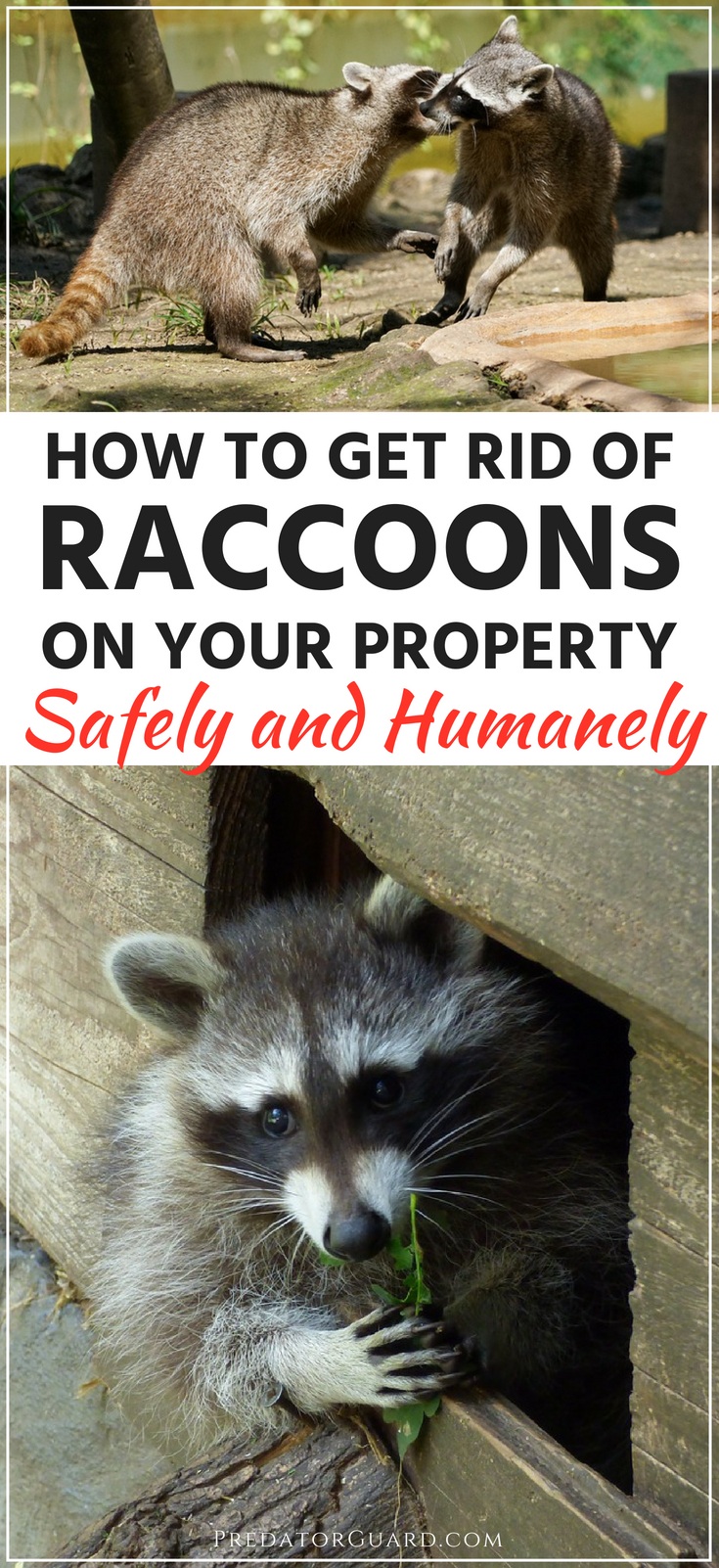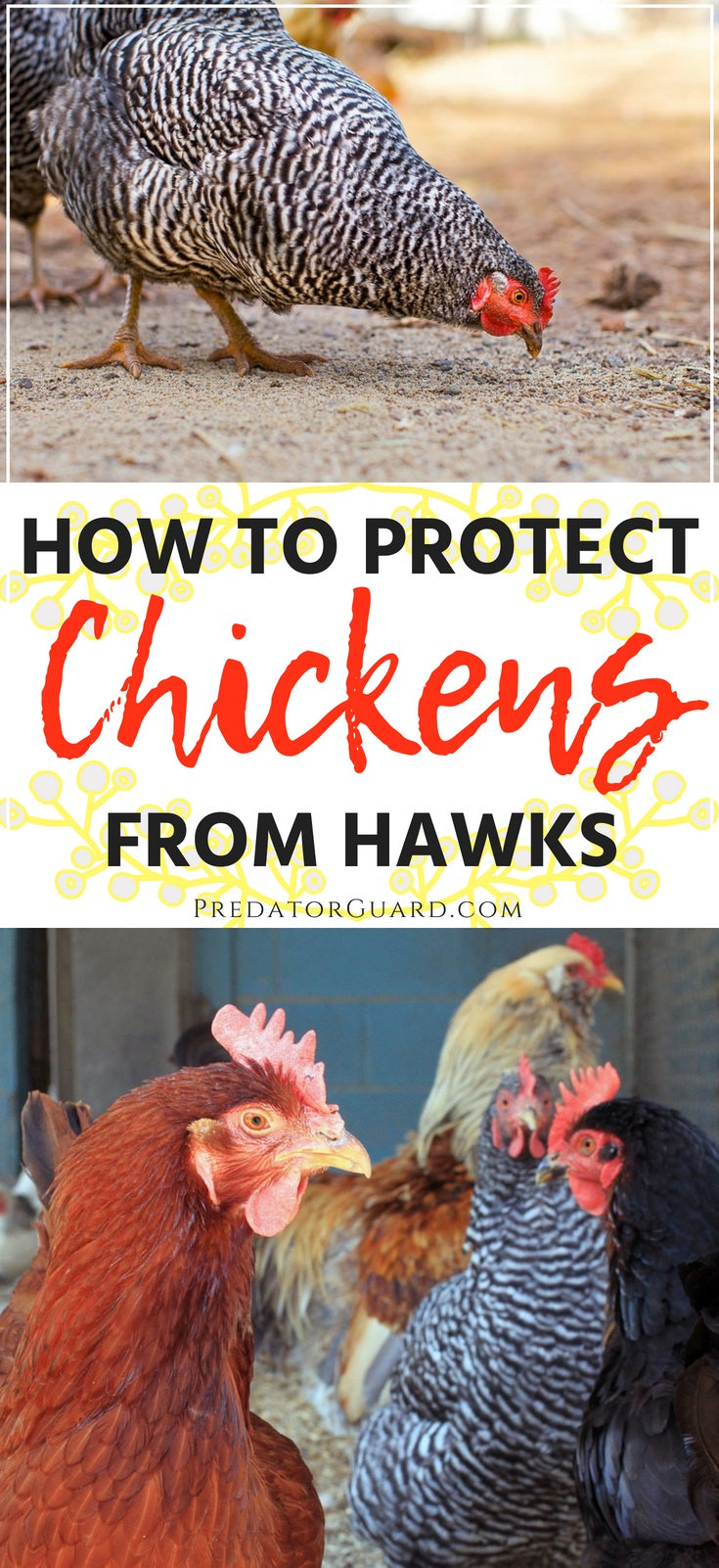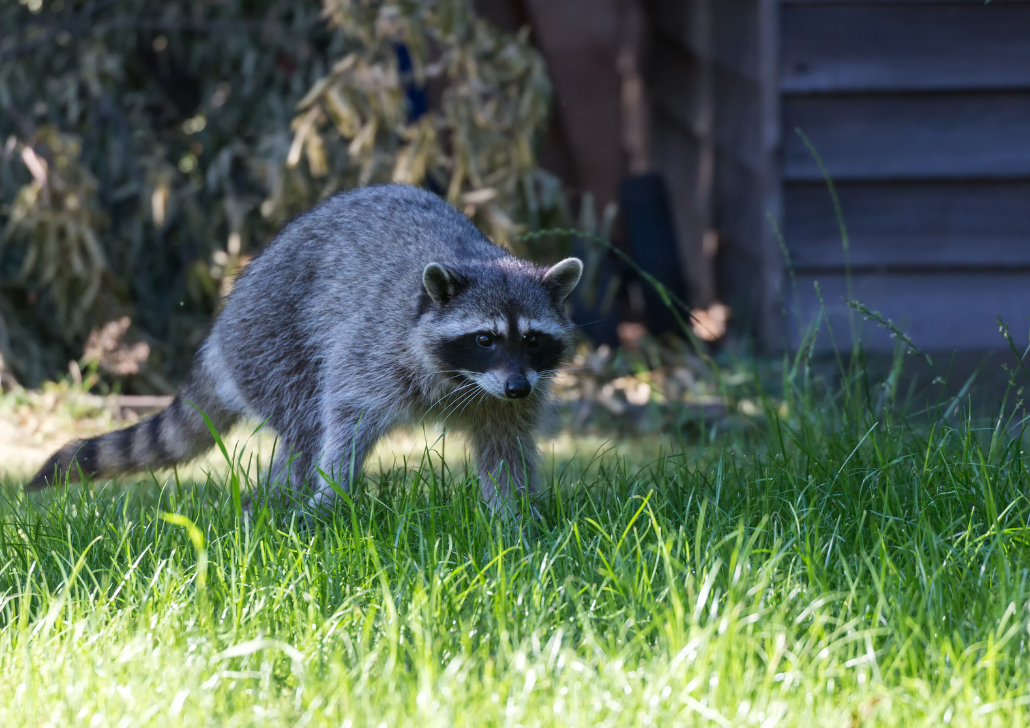Tips on how to get rid of raccoons in your home, yard, or attic humanely and safely.
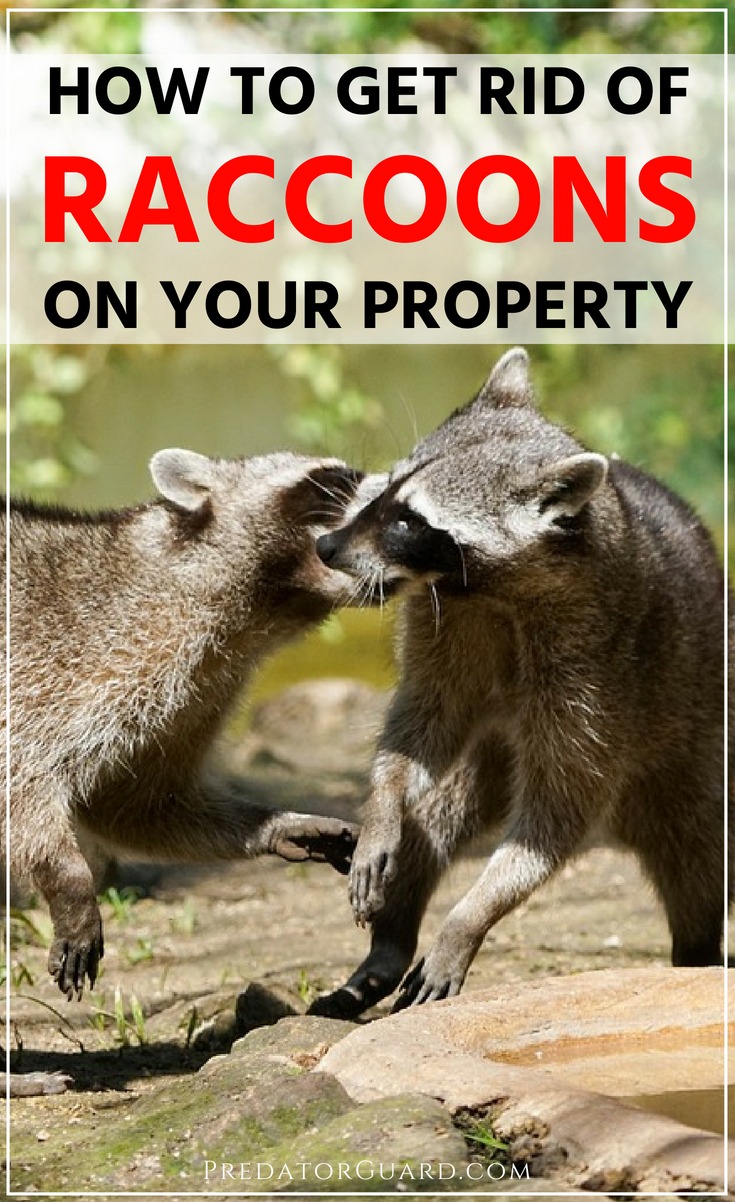

Whether you live in a rural area, or deep in the city, raccoons can move in on your property and cause a ton of damage. They scratch up grass in search of grubs, they chew electrical wires, and they even carry disease and roundworm. In fact, they're one of the most common species to carry rabies, and they've been known to attack pets and humans.
Raccoons are great climbers, and are able to open simple locks and doors. They're extremely intelligent and curious and they communicate with each other using over 200 different sounds.
Finding any pest animal on your property or in your home is bad, but raccoons in particular pose quite a threat to your health and safety.
Raccoons are great climbers, and are able to open simple locks and doors. They're extremely intelligent and curious and they communicate with each other using over 200 different sounds.
Finding any pest animal on your property or in your home is bad, but raccoons in particular pose quite a threat to your health and safety.
How To Get Rid of Raccoons Humanely
.jpg)
In Your Yard
Raccoons will be attracted to your yard when there are food sources readily available. Removing these attractants ensures that raccoons will move on and find somewhere else to hang out. There's no sense in staying where there's no food, right?
Keep Your Yard Clean
Keeping your yard clean is vital to deterring raccoons (and other animals for that matter). Removing any piles of brush, debris, and wood will cut down on the likelihood that raccoons will make your yard their new home.
Unfortunately, raccoons will be attracted to your garden, particularly in the Fall. It's important that you protect your vegetables and fruits, and you certainly should pick up any fallen fruit, as this is an easy meal that can easily be removed.
Close Off Access To Trash
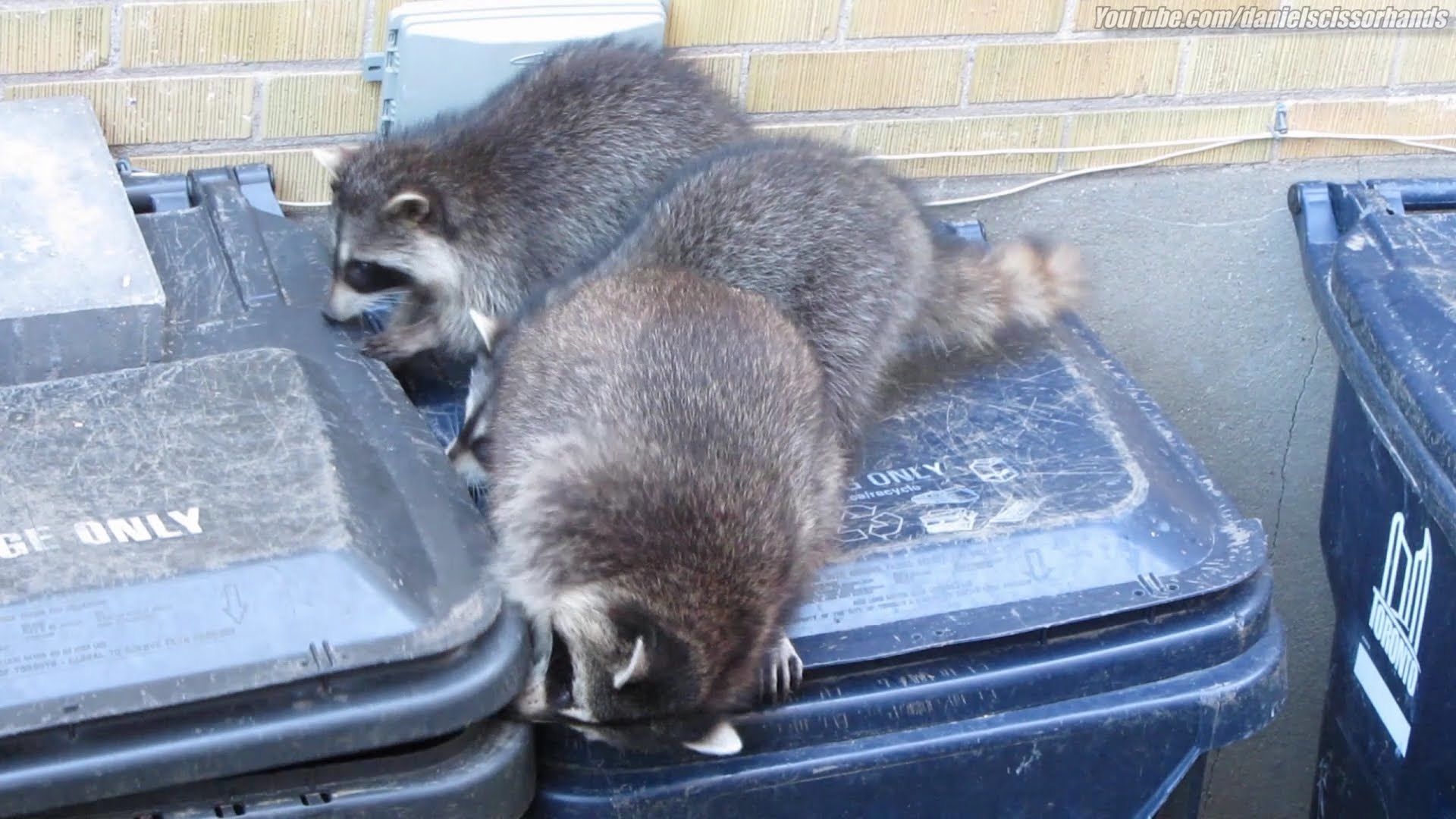
If raccoons are a problem in your area, it's important that you don't let your trash pile up. Even putting your trash outside your front door for one night is a big no-no.
Buy a trash can with a secure lid, and be proactive about taking your garbage out.Raccoons have no qualms with picking through your discarded items in search of fruit peels, wrappers, or anything else with bits of food still on it.
Get Rid of Insects and Grubs
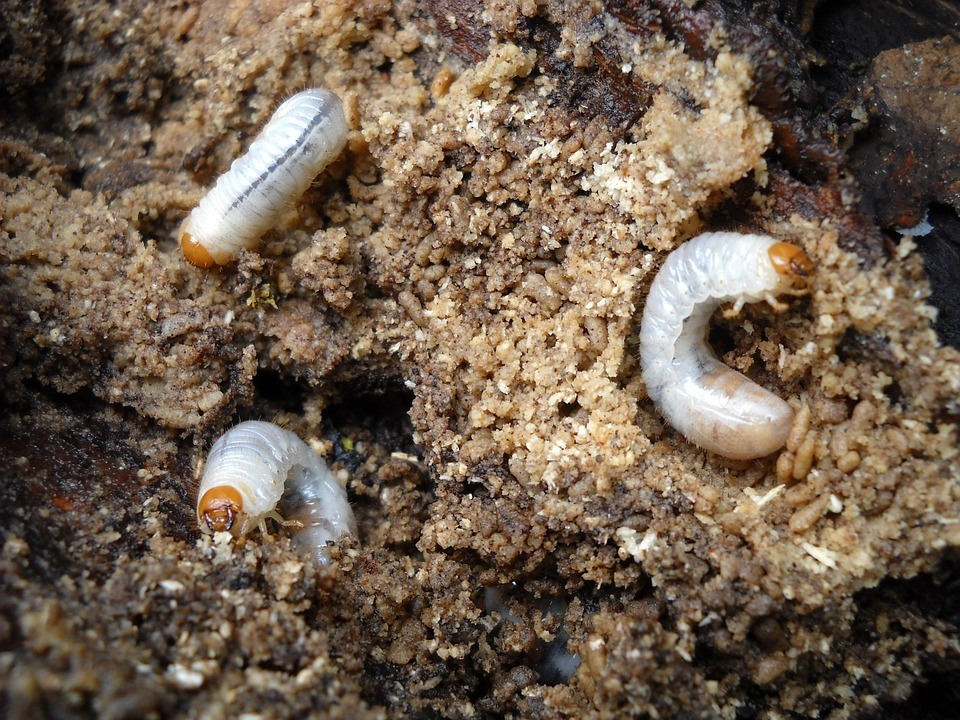
Along with fruits, vegetables, pet food, and garbage, raccoons love grubs. If your yard has grubs, you may need to consider getting rid of them so as not to continuously attract raccoons to your property.
How To Tell If There Are Grubs In Your Yard - Grubs stay just under the surface, feeding on grass roots and organic matter in the soil. If there are patches of brown grass in your yard, try lifting up a piece of your turf in this area. If it rolls up like a carpet, or if you can easily pull the grass to see that there are no roots, grubs are likely to blame.
How To Get Rid of Grubs - To get rid of grubs in your yard and deter raccoons from digging up your grass, you should apply beneficial nematodes to your yard. These microscopic insects are NOT harmful to humans, pets, or even earthworms. They will, however, disintegrate the grubs under the surface of your yard.
This is not an immediate fix, but because they are a safe alternative to chemical pesticides, beneficial nematodes are used all over the world. This will also prove to be a wonderful long-term solution.
Install Solar LED Deterrent Lights
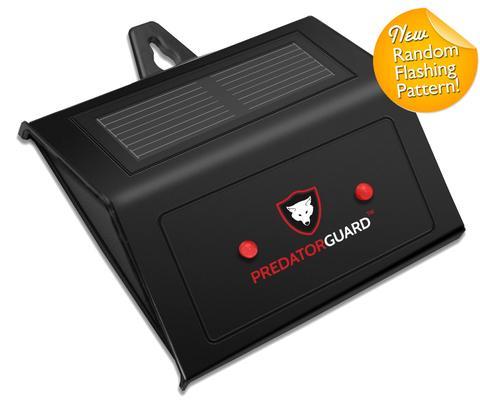
Our Solar LED Deterrent Lights effectively keep raccoons off of your property, as they mistake the lights for the eyes of a predator. This triggers their flight-response.
For maximum success, these units should be placed at eye-level of the raccoons.
Keep Your Yard Clean
Keeping your yard clean is vital to deterring raccoons (and other animals for that matter). Removing any piles of brush, debris, and wood will cut down on the likelihood that raccoons will make your yard their new home.
Unfortunately, raccoons will be attracted to your garden, particularly in the Fall. It's important that you protect your vegetables and fruits, and you certainly should pick up any fallen fruit, as this is an easy meal that can easily be removed.
Close Off Access To Trash

If raccoons are a problem in your area, it's important that you don't let your trash pile up. Even putting your trash outside your front door for one night is a big no-no.
Buy a trash can with a secure lid, and be proactive about taking your garbage out.Raccoons have no qualms with picking through your discarded items in search of fruit peels, wrappers, or anything else with bits of food still on it.
Get Rid of Insects and Grubs

Along with fruits, vegetables, pet food, and garbage, raccoons love grubs. If your yard has grubs, you may need to consider getting rid of them so as not to continuously attract raccoons to your property.
How To Tell If There Are Grubs In Your Yard - Grubs stay just under the surface, feeding on grass roots and organic matter in the soil. If there are patches of brown grass in your yard, try lifting up a piece of your turf in this area. If it rolls up like a carpet, or if you can easily pull the grass to see that there are no roots, grubs are likely to blame.
How To Get Rid of Grubs - To get rid of grubs in your yard and deter raccoons from digging up your grass, you should apply beneficial nematodes to your yard. These microscopic insects are NOT harmful to humans, pets, or even earthworms. They will, however, disintegrate the grubs under the surface of your yard.
This is not an immediate fix, but because they are a safe alternative to chemical pesticides, beneficial nematodes are used all over the world. This will also prove to be a wonderful long-term solution.
Install Solar LED Deterrent Lights

Our Solar LED Deterrent Lights effectively keep raccoons off of your property, as they mistake the lights for the eyes of a predator. This triggers their flight-response.
For maximum success, these units should be placed at eye-level of the raccoons.
In Your Attic, Garage, or Under Deck
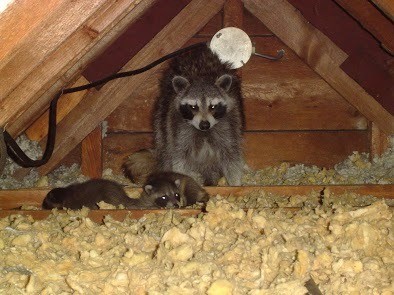
Raccoons are dangerous, and their removal should be taken seriously. It's one thing to have them in your yard, but once they start encroaching on your home, you really must be proactive.
Not only have raccoons been known to attack pets and even humans, 70% of raccoon feces is infected with Baylisascaris roundworm.
According to the CDC, "Roundworm eggs are passed in the feces of infected raccoons, and people become infected by ingesting eggs. Anyone who is exposed to environments where raccoons frequent is potentially at risk."
Installing LED Deterrent Lights and following the recommendations above would be a good place to start. If these things do not work, you can move on to some of the tips below. Raccoons can cause a ton of damage to your home, and once they're settled in, it can be extremely difficult to get them out.
Identify and Prepare To Block Off Entry Points
If raccoons are moving in on your attic, garage, or under your deck, it is crucial that you identify the entry points.
The most common reason raccoons break into attics is when a female is caring for a litter.
Please note that you should not immediately block them off until you're certain that there aren't any raccoons inside. Should you accidentally trap some of the inside, it could create a volatile situation, especially if you separate a mom from her babies.
Set Traps
Not only have raccoons been known to attack pets and even humans, 70% of raccoon feces is infected with Baylisascaris roundworm.
According to the CDC, "Roundworm eggs are passed in the feces of infected raccoons, and people become infected by ingesting eggs. Anyone who is exposed to environments where raccoons frequent is potentially at risk."
Installing LED Deterrent Lights and following the recommendations above would be a good place to start. If these things do not work, you can move on to some of the tips below. Raccoons can cause a ton of damage to your home, and once they're settled in, it can be extremely difficult to get them out.
Identify and Prepare To Block Off Entry Points
If raccoons are moving in on your attic, garage, or under your deck, it is crucial that you identify the entry points.
The most common reason raccoons break into attics is when a female is caring for a litter.
Please note that you should not immediately block them off until you're certain that there aren't any raccoons inside. Should you accidentally trap some of the inside, it could create a volatile situation, especially if you separate a mom from her babies.
Set Traps
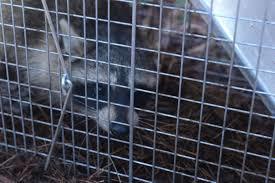
Setting some humane door traps is a good way to get raccoons out of your home. You should place them near the entry points, and if you're not sure where they're getting in, simply set them anywhere you see damage or evidence of the raccoons.
Once you're certain that you've caught them all, close the entry points and release them. You'll need to do some research first, as it can actually be illegal to relocate and release raccoons on public land in some states. You should also take care when making this decision.
Releasing them too close to your home might prove to be ineffective, as they'll make their way back and start all over again. Furthermore, urban raccoons that are released in wooded, undeveloped areas might not fare well with the change.
Don't forget to provide the raccoons with water if they're trapped for an extended period of time. You can try offering them a little food as well, but they may not eat it due to stress. The best thing you can do is work quickly to find a place to release them.
Use Lights and Sounds To Scare Them
Placing a radio and motion-activated lights near the entry points may work to scare the raccoons away from your home. Unfortunately, this isn't always effective. Once raccoons create their den and make themselves comfortable, they can become stubborn and unwilling to leave. In fact, they might go to great lengths to protect their area.
Restrict Access To Food and Water
Like any other animal, raccoons will stay where there is easy access to shelter, food, and water. You'll want to make it uninviting for them to stick around by keeping your garbage secure, and closing off any areas to water or food.
In order to be effective, it's recommended that you practice a combination of these techniques for raccoon removal. Additionally, you'll need to continue taking preventative measures to ensure that it doesn't happen again, especially if you live in an area with a high density of raccoons.
Have raccoons been in your yard or home? What worked for you? Leave a comment below. We'd love to hear from you!
Once you're certain that you've caught them all, close the entry points and release them. You'll need to do some research first, as it can actually be illegal to relocate and release raccoons on public land in some states. You should also take care when making this decision.
Releasing them too close to your home might prove to be ineffective, as they'll make their way back and start all over again. Furthermore, urban raccoons that are released in wooded, undeveloped areas might not fare well with the change.
Don't forget to provide the raccoons with water if they're trapped for an extended period of time. You can try offering them a little food as well, but they may not eat it due to stress. The best thing you can do is work quickly to find a place to release them.
Use Lights and Sounds To Scare Them
Placing a radio and motion-activated lights near the entry points may work to scare the raccoons away from your home. Unfortunately, this isn't always effective. Once raccoons create their den and make themselves comfortable, they can become stubborn and unwilling to leave. In fact, they might go to great lengths to protect their area.
Restrict Access To Food and Water
Like any other animal, raccoons will stay where there is easy access to shelter, food, and water. You'll want to make it uninviting for them to stick around by keeping your garbage secure, and closing off any areas to water or food.
In order to be effective, it's recommended that you practice a combination of these techniques for raccoon removal. Additionally, you'll need to continue taking preventative measures to ensure that it doesn't happen again, especially if you live in an area with a high density of raccoons.
Have raccoons been in your yard or home? What worked for you? Leave a comment below. We'd love to hear from you!
If you liked this post, don't forget to pin it for later:
